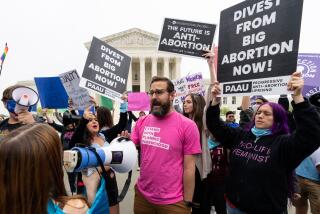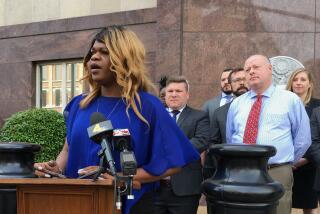Free Parental-Rights Appeal Ordered by Supreme Court
- Share via
WASHINGTON — Opening the courthouse door to a low-income woman who seeks the right to see her children again, the Supreme Court ruled Monday that states may not set high fees or other costs that effectively bar poor people from legal appeals in parental-rights cases.
“No ties are more precious than those binding parent and child,” said Justice Ruth Bader Ginsburg, speaking from the bench.
Her opinion for a 6-3 majority requires Mississippi court officials to waive a $2,352 transcript fee imposed on a young waitress who appealed the loss of her two children.
Over the years, the Supreme Court has been reluctant to force the government to subsidize civil suits, many of which involve property disputes and money claims.
Monday’s ruling cuts out a narrow exception for court orders that terminate parental rights.
These decrees “work a unique kind of deprivation . . . [and] involve the awesome authority of the state to destroy permanently all legal recognition of the parental relationship,” Ginsburg said. Before finally taking away such a fundamental right, the state must at least allow the parent a chance to appeal, she said.
The ruling revives an appeal filed by Melissa L. Brooks, whose parental rights were terminated by a judge in Benton County, Miss. Most states, including California, waive court costs for poor persons in parental-rights cases. But Mississippi has refused to make any accommodation for the poor.
In 1992, Brooks and her husband divorced and their two children were kept in his custody. After he remarried, the husband won a court order that allowed his new wife to adopt the children. Though no evidence was presented that Melissa Brooks had abused or mistreated her children, the judge nonetheless terminated her rights even to visit them.
Melissa Brooks was told that she had to pay $2 per page for a court transcript that ran nearly 1,000 pages, along with a $438 fee for other documents. Earning only $2.15 an hour as a waitress, Brooks said that she could not pay the costs.
The Mississippi Supreme Court then dismissed her appeal.
*
“In view of the magnitude and permanence of the loss at stake . . . we hold that Mississippi may not deny Melissa L. Brooks, because of her poverty, access to appellate review to test the adequacy of the evidence on which she was judged unfit to remain a parent,” Ginsburg said in the case (M.L.B. vs. Mississippi, 95-853).
“This is a grand Christmas present. This is the best news I’ve heard in a long time,” Brooks said after the ruling. “I’m going to take my case to the [state] Supreme Court now and I hope I can get my rights back.”
She said she has not seen her children in three years.
Robert B. McDuff, the Jackson, Miss., attorney who took the case to the high court on behalf of Brooks, said the ruling “affirms that in cases of this magnitude, the states cannot open their courthouses to the rich and close them to the poor.”
Knowing that the high court would be wary of ordering a broad right to free appeals in civil cases, McDuff stressed in his argument that the loss of a parental right is unique. That narrow focus almost surely helped in stitching together a majority for the ruling.
Ginsburg’s opinion said that the court was not insisting on free appeals in all “domestic-relations matters, such as divorce, paternity and child custody,” but rather only in those that involve a “parental-termination decree.”
Her opinion was signed by Justices John Paul Stevens, Sandra Day O’Connor, David H. Souter and Stephen G. Breyer. Justice Anthony M. Kennedy concurred in a separate opinion.
Dissenting, Justice Clarence Thomas faulted the majority for creating a “newfound constitutional right to free transcripts.”
“The transcript rule reasonably obliges would-be appellants to bear the costs of availing themselves of a service the state chooses, but is not constitutionally required, to provide,” Thomas said. He urged the court to reverse its precedents allowing free appeals for the poor in criminal cases.
Forty years ago, the court ruled that the states must waive court fees for impoverished defendants who are appealing criminal charges. Because liberty is a fundamental right, the Constitution does not allow the government to deprive persons of this right because of inability to pay, the court said in 1956 in Griffin vs. Illinois.
Thomas, in his dissent, said that he would “vote to overrule Griffin.” Justice Antonin Scalia agreed. Chief Justice William H. Rehnquist, while dissenting from the majority in the Brooks case, said he did not agree with Thomas’ call to overturn the Griffin ruling.
More to Read
Get the L.A. Times Politics newsletter
Deeply reported insights into legislation, politics and policy from Sacramento, Washington and beyond. In your inbox twice per week.
You may occasionally receive promotional content from the Los Angeles Times.











